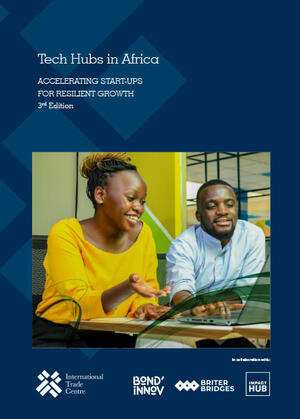


Pivoting to digital solutions helped African tech hubs survive COVID-19
Hubs that digitized their services and continued to bring value to clients during pandemic-related lockdowns are examples of resilience that can serve as models for the future, an ITC report finds.
African tech hubs underpin digital, social and economic transformation across the continent by nurturing technology start-ups and fostering innovation. But COVID-19 has altered the entrepreneurial support landscape in Africa, and hubs need guidance on how to remain resilient in the post-pandemic environment, survive future crises and continue to help start-ups achieve their goals.
A new report by the International Trade Centre (ITC) offers that guidance, highlighting the need for hubs to adopt digital tools for delivering services and diversify their business models. This third edition of Tech Hubs in Africa examines what the pandemic meant for African tech hubs, incorporating survey data from 52 hubs, interviews with dozens more and ‘success stories’ that illustrate what worked well and why.
The report finds that the most defining parameter for tech hubs to succeed – and to support African entrepreneurship development – is their ability to digitalize services. More than 1,000 hubs operated across Africa in 2021, encouraging networking among like-minded entrepreneurs, giving access to training, mentor and potential investors, and offering related services to start-ups. About 73% lost revenue due to pandemic-related lockdowns and upwards of 40% lost more than half of their income, with some closing permanently.
Those that survived and thrived – such as Senegal’s CONCREE, Togo’s CUBE, Tunisia’s Open Startup and Uganda’s StartHub Africa – were connected to networks and able to switch their operations online. The common thread among these hubs was a pivot away from space-based revenues to digital offerings that sidestepped fixed costs in rent and other overhead.
‘Tech hubs that thrived were those that adapted to the new era,’ the report says. ‘They rapidly moved their training online, for example. They also looked closely at their costs to run physical spaces, and took some hard decisions to stay afloat: tech hubs were forced to rethink their business models.’
Recommendations for hubs, funders and policymakers
While ‘hybrid’ services is the norm today, digital skills are more important than ever to succeed in business, says the report, which urges African tech hubs to nurture these skills. It recommends that hubs conduct a thorough feasibility study before launching to understand what is needed and what structure is most suitable. They should also define core purpose to bring greater value to the ecosystem rather than trying to be a ‘jack of all trades’.
New and existing hubs should work together to tackle systemic issues, the report says. They should seek feedback, remain flexible to consider adjusting strategies and approaches, and be strategic about funding.
The report also serves as a toolkit for governments and funders to invest in the infrastructure that promotes tech entrepreneurship. It advises funders to be flexible, take a long-term approach when supporting hubs and collaborate with other funders when there is a shared interest, a strong mandate and complementary skills.
Policymakers are urged to build a sound foundation to ensure that basic offerings such as mobile phones, internet and mobile money are broadly accessible. They should enhance digital literacy, provide an enabling environment for hubs and start-ups, and involve both when developing policy, the report says.
‘Many of the problems that tech hubs faced before COVID-19 remain a reality today,’ says ITC Executive Director Pamela Coke-Hamilton. ‘With no end in sight to the crises that are reshaping the global economy, now is the time to help create a more supportive entrepreneurial ecosystem for tech hubs and the small businesses they serve.’








